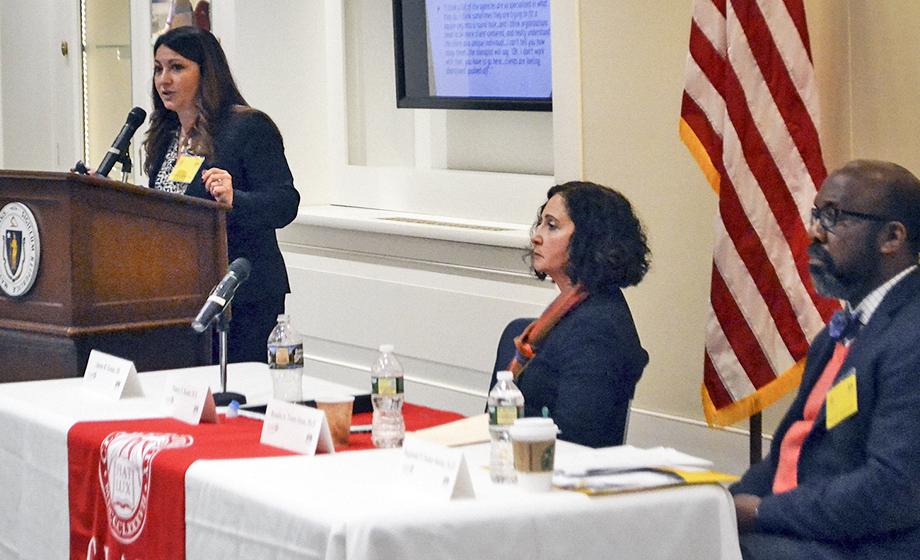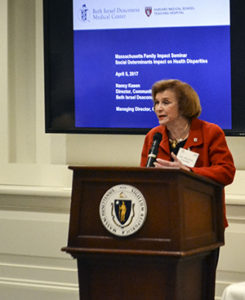
The Mosakowski Institute for Public Enterprise at Clark University hosted its eighth annual Massachusetts Family Impact Seminar on April 5 at the State House, bringing the latest research on health disparities to Massachusetts legislators. With the ongoing debate over the Affordable Care Act, many policymakers and researchers again are focused on the role of race, ethnicity, immigration status, income, education and a host of other factors on a person’s health.
Senate Majority Leader Harriette L. Chandler, M.A. ’63, Ph.D. ’73, and James Gomes, director of the Mosakowski Institute, welcomed the audience and presented three public health experts speaking on “Unhealthy, Unwealthy: Health Disparities in Massachusetts.”

“Health disparities aren’t simply due to lack of access to care. A number of factors influence a person’s health,” said Nancy Kasen, director of community benefits for Beth Israel Deaconess Medical Center and managing director of the hospital’s Community Care Alliance, which serves 100,000 patients at six health centers. “Research estimates that roughly only about 20 percent of a person’s health is due to accessing medical care, another 20 percent is due to genetics and the overwhelming majority of health is due to the social determinants of health — the conditions in which people are born, grow, work, live, age, and the wider set of forces and systems that shape the conditions of life.”
These systems, Kasen says, are interrelated and interdependent and range from education and transportation to housing and economic policies. As an example, she pointed to a recent Harvard School of Public Health and Ben Gurion University of the Negev study on chronic absenteeism in Massachusetts’ K-12 public schools.
“The researchers found a very strong, significant correlation between increased air pollution, decreased greenness surrounding schools, and chronic absenteeism,” Kasen noted, “and chronic absenteeism is associated with poor academic performance and increased likelihood that a student will drop out.”
In turn, a person’s lower educational attainment is correlated with later health issues: shorter life expectancy, higher rates of obesity, difficulty managing chronic diseases, less likelihood of wearing a seatbelt and more.
“We must continue to advocate for the Affordable Care Act and be the voice for those who don’t have a voice,” Kasen said. She also recommended creating a Massachusetts “Moving to Opportunity” demonstration project that would provide vouchers to lift families out of low-income neighborhoods, as well as considering the impact that all the state’s policies and programs have on health and health-care issues.
Reginald Tucker-Seeley, assistant professor of social and behavioral sciences at the Harvard School of Public Health and Dana-Farber Cancer Institute, laid out the connections between a family’s financial stress and cancer care and survivorship.
“The cost of cancer care is rising faster than that of any other diseases. These rising costs are not known at the start of treatment, and discussions about these costs are not a routine part of the process as patients navigate or are navigated through care
“Across many studies, research has shown that financial hardship is associated with factors including use of intensive end-of-life care, poor oral health, morbidity and mortality,” Tucker-Seeley said.
Many families are not financially ready to pay for the cost of cancer treatment, an issue that is coming into focus as more Baby Boomers age and become dependent on Medicare.
“The cost of cancer care is rising faster than that of any other diseases,” he said. “These rising costs are not known at the start of treatment, and discussions about these costs are not a routine part of the process as patients navigate or are navigated through care.”
He cited a Kaiser Family Foundation study that found that 25 percent of families use up all or most of their savings when faced with paying for cancer treatment, and 11 percent are unable to pay for basic necessities like food, heat or housing.
“For households with fewer socioeconomic resources, the costs to manage the additional and sometimes unexpected out-of-pocket expenses can be especially devastating,” Tucker-Seeley noted.
He suggested a number of strategies to address these issues, including stress reduction and financial literacy programs.
Rosalie Torres Stone, associate professor of sociology at Clark, presented the results of a 2015 assessment of Worcester’s community mental health needs. She was a primary author of the study along with Esteban Cardemil, associate professor of psychology at Clark, and Kristen Keefe, a doctoral student in clinical psychology who is working with Cardemil.
Their study found that barriers to mental health treatment result from residents having difficulty navigating the mental health system; immigrants from non-Western countries not always recognizing symptoms of stress and the ability to seek treatment; immigrants, refugees and military veterans often avoiding treatment due to the stigmas associated with mental health; language and cultural barriers; and long waiting lists to see providers.
Part of the Worcester Division of Public Health’s ongoing Community Health Improvement Plan, the study recommends greater and broader coordinated care; increased use of case managers, patient navigators/advocates and community health workers; a greater network among providers; and addressing stigma-related concerns.
The research presented at this Family Impact Seminar and others help legislators “stay ahead of the curve” on complex subjects, Chandler said.
Denise A. Hines, associate research professor of psychology at Clark, is director of the Massachusetts Family Impact Seminar.


